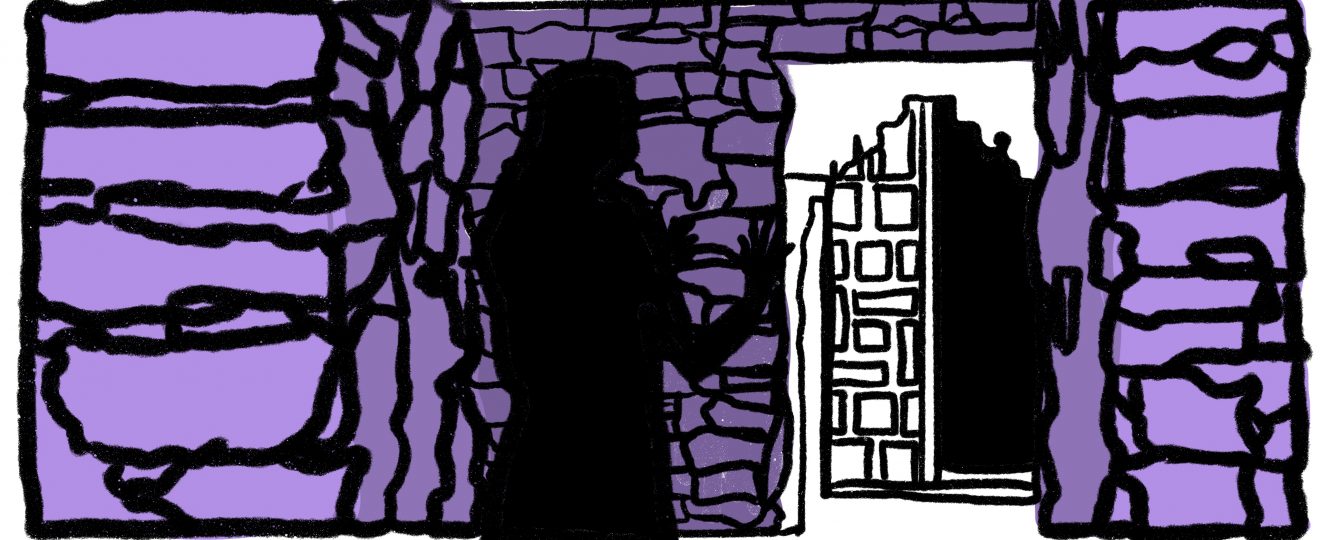Doorways have long been regarded as symbols of opportunity, of new beginnings and silver linings. Yet, doorways in the world of mystery, folklore and fairy tales also represent the realm of the unknown, the realm of the hidden reward or of abject horror. Doorways when they are closed shut reflect an avenue that has been closed, or even a form of entrapment. This one singular element becomes a symbol of a complexity of meaning, depending upon circumstances and how we view the situation it is placed in. This is a tale that draws upon these multiple representations to tell the story of family, of community, of curiosity and of embracing new opportunities.
rukhsar
The Haveli was old. They say it was built by Jahanara herself in the 17th Century, when she commissioned the rest of Chandni Chowk. Chandni Chowk, (Moonlit Square), is the crowded ancient Mughal marketplace that still remains one of the most popular and well known parts of Old Delhi. When it was built it was the pride and glory of the Mughal Empire, the bazaar where only the best of the best was sold; precious stones, jewellery, textiles ranging from silks, satins, crepe, cotton and muslin, spices from all around the world. It was visited by merchants from far off lands, and visitors would marvel at the treasures of Delhi at every glance. It is still known for some of these commodities, with Nai Sarak, Dariba and Khari Baoli being popular names across the country for wholesale goods of every kind. One thing that remains consistent is the laughter and sound echoing in the narrow winding lanes, always bustling with people. For someone visiting for the first time the combination of colors, activity, sounds, smells, and touch can be overwhelming for the senses. The chaos does take some time to get used to, but once you are immersed into it, it is almost impossible to stop looking around in wonder. Each walk through a new lane presents a new sight, sound, smell or feeling to be devoured. It’s the same place, but always with a new facet.
On one of these corners deep inside the bustling Chandi Chowk, stood the Haveli. In the old days they said that the outside walls were painted a royal golden yellow on the whim of the then young begum, the head of the household. The doorway to the Haveli was a sight that no one could forget. The begum had it arranged and shipped all the way from the northern end of the country, when her friend wrote to her about a doorway that she happened to see. The Begum always believed that doorways were auspicious because they were the first port of entry into the household. This one was a large dark wood, two door opening, embellished with gold and iron carvings. Two small brass elephants were embedded on the outside to welcome visitors and evoke wisdom, health and wellbeing. Every morning, the door was drawn open by two attendants, and left that way for the day until nightfall. The begum had instructed that this be done every single day without fail, because she wanted her home to always be open to the community around her. The house was always known for being a multi-cultural space, always bustling with people: visitors from foreign lands, locals who came to greet the family from the surrounding areas. On festivals, be it Holi, Diwali, or Eid the doors of the Haveli opened and there was a lavish celebration, every time on every occasion.
But those were the old days, and sixteen years later, nothing remains the same. The outside walls are now murky, dusty and crumbling. The once lush, trees, plants, climbers and vines have grown in knots, unruly, covering the brick surface, dark, dry but thriving despite the decay of the structure. The doors are permanently locked closed, the elephants gathering dust. No one except an old attendant, who gathers food and supplies, comes out or goes in. There is barely any trace of life within the ancient walls, no sound, no song, no joy. No-one knows what lies inside or who even stays there anymore.
Legend has it that the old master forbade all celebrations after the death of his wife. It is also believed that he now lives inside all alone with a young girl. The begum herself brought her home as a child wrapped in a soft muslin cloth. The master and the begum never had any children of their own, so this was considered an auspicious adoption, and there had been a celebration to commemorate the event. They called her noor meaning ‘the light’ and people from all around Delhi came to bless the baby girl. Everyone felt that the chosen name, given by the begum, was befitting: noor would bring even more light to the household and the family. But alas, destiny had other plans. Just months after, tragedy befell and with the passing of the begum the Haveli that had once been the emblem of light on the street was shrouded in darkness. The wooden doorway was locked on the day she passed, and it had not been opened even once in all these 16 years since.
No one saw the child again.
It is almost as if the baby girl’s existence has been entirely erased and forgotten.
noor
running through the winding lanes,
making her way through the crowds
on one side of the street, a tailor sat with his singer machine,
one the other, a woman in an orange saree, pushing a cart of green coconuts.
amidst the morning chatter, as the bazaar slowly opens up
her laughter echoes, as she swiftly turns into a narrow lane
the old houses, with their balconies and carved wooden windows
dainty feet adorned with silver anklets sound.
she rushes to her favourite poori wala round the corner
the smell of the fresh, hot pooris fill her nostrils from metres away
behind, she can here an old song playing on the radio
as a key maker sets up his stall
she hums along as she tastes a little bit of heaven in those early morning pooris.
she’s a child of these narrow winding lanes of dilli 6,
she’s always going to be that way
It was starting to get warm again, moving in from that liminal moment of pleasant weather between the cold winter and the sweltering summer. Spring time had always felt like the perfect time of the year.
Noor opened her eyes, staring at the ceiling, the fan turning round and round at a slow but steady pace. She got out of bed, sweating slightly and opened the curtains looking out of her window. The morning sun streamed into the room through the years old peepal tree that stood outside her window at the rear end of the house. The leaves catching the light, a series of shadows mimicking embroidered cloth reflected upon the floor, and the bare skin of her feet. Every morning, she got out of bed and looked out of the window. From this side of the house, she couldn’t really see many people, just the large tree, and a couple of other plants and homes in the distance. Every morning, she heard the chirping of the birds sitting upon the tree, and wished that she too could be out on the street.
Right as she unlocked her door, and stepped out into the corridor, she looked at the doorway of their haveli. It was tall, and heavy, towering over all of them. Dark wood, the once golden and silver carvings now dim and grey, almost entirely having lost their shine. They never, not once in her living memory, opened those doors. Every day she saw them like this, just the same for 16 years from her room.
Her day was spent immersed in different tasks around the house. She would wake up, walk around and see the attendants carry out different tasks. She would then take a cup of tea down to her father in the verandah where he sat on a can rocking chair, newspaper in one hand, a cigarette in the other. They wouldn’t talk much, they never had, but there seemed to be a mutual respect and understanding at most times. However there were moments, when the silence became too loud; as she got older, she had more questions. She wanted to know what lay on the other side of the haveli’s wooden doorway. She wanted to know why they never left, why the world that she read about in her books was closed to her. She wanted to know whether anything actually existed. There were times, she had asked him, tried to talk to him about it. But she didn’t get much of a response. She was given another book, to help her with her desires and questions.
She asked Ramprasad, the housekeeper and her one confidant for all these years, why things were like this. She knew he left the Haveli everyday to procure her fathers newspaper, any spices or vegetables they needed from the outside, and his box of cigarettes. But she never saw him going out. He didn’t go through the main doorway, that she was sure of. He went missing at the same time in the early hours of the morning everyday. When she asked him where he left from, he smiled at her. Sometimes he got her gifts from the ‘outside’, secretly. The hot pooris, and freshly baked butter biscuits called naankhatai, were her favourite. She would take them up to the terrace, sit with books reading and munching, devouring them hot as they melted on her tongue. Sometimes she even took the old transistor she found in the storage room while wandering around one afternoon up there and played old Bollywood songs. She finished up with a cup of spiced piping hot tea in the winters or a glass of cold sikanji (sweet lemonade), in the summer. Some of her fondest memories were spent on the terrace.
Some days she would sneak out of her room and go up there at night laying on a charpoy. She would watch the moon change phases, she would try and identify the constellations. It was here, under the starlight, that she thought about her life. Just because she had stayed inside all her life, doesn’t mean she had been denied an education. Her father, though he spoke little, had ensured that she could read, write, and know about the world out there. Yet, sitting on the terrace made her think about what she had not seen: the world outside. If she was quiet enough, she could walk along the terrace and jump onto the other side of the house from where she could see the streets ahead more clearly without obstructions. Even as night fell, a few people could occasionally be seen walking down the street.
On one particular night, she saw a crowd of people emerge. She had heard chatter, and music that evening from a distance. The sound of the azaan, and she knew it was the month of Ramadan. She had asked Ramprasad about it, she had also read about it in her books. A period of fasting to express devotion and then a feast on Eid! How she wished she could go out and join the celebration, eat with people, talk with them, dance with them. From the terrace that night she saw the largest crowd she had ever seen in her life, and it occurred to her that each one of them looked so different.
She decided to ask her father if she could go out for a trip. As she thought about how to put the question forward, she also wondered again why she had been trapped within for so long. Why couldn’t she leave, why weren’t the doors of the haveli opened? What lay beyond that was so dangerous, so damaging?
running through the winding lanes,
as nightfall’s, maybe she can sneak out?
The streets are not crowded at night,
though in delhi 6 the chatter doesn’t stop
whether it is someone taking a walk round the corner,
a few old men sitting on a charpoy with their deck of cards,
or the sound of music from a dargah somewhere beyond,
even in the silent night, there are things going on.
the doorway is hard to open,
but maybe she can find another way out
she’s a child of these narrow winding lanes of dilli 6,
she’s always going to be that way
dev
To say that if an old acquaintance came to visit Dev, he wouldn’t be recognisable is an understatement. In the sixteen years since his wife’s passing the master of the house had been completely transformed. The fact is however, that he didn’t look much different on the surface, except for the slight greys that appeared on his head, and the few extra indentations that age had brought upon his face. His eyes remained just the same. Despite this surface level similarity, nothing about this Dev resembled the one that lived in the Haveli 16 years ago. The once humorous, always laughing and compassionate young master, the life of the locality, completely enamoured by his young wife, had transformed over the years into a quiet, lonely and cold figure. It is true that Dev had become silent; perhaps a result of the long inability to process his grief, and a guilt of survival.
The arrival of baby Noor into the household seemed to fill the only gap in their lives. They were happy before Noor, but the day she arrived, Rukhsar carrying her in a beautiful muslin cloth, was when Dev realised that he could be happier. Rukhsar said that the baby girl had been left by her sister’s doorway during the pre-diwali rush. They had waited for almost two weeks, sent word to the local ministers, but no one came to claim the child and it was then that it was decided. Rukhsar and him would adopt the child, because she was sent for them.
But their joyous moments were short lived, and just six months after Noor was brought home, Rukhsar passed away after a short illness, completely unexpectedly. Everything changed then, and people started to talk as they did in the community. There were a few who supported them in these times, but countless walks in the lanes revealed the gossip that had been going around. A few questioned the match between Dev and Rukhsar due to their religious differences. Others blamed the baby girl Noor, deeming her inauspicious, and responsible for the death of their beloved Begum.
It was then, in a fit of rage that the master called upon Ramprasad to close the doors of the haveli. The house would no longer be open to the community, and Noor would grow up inside, protected from the gossip. Ramprasad advised the young master, that the community was with them and they were with Noor, and to shut them out in a time of grief due to a few miscreants wouldn’t be good for the household. He said that difficult times require support and the entire neighbourhood had been working on providing that to the master and the young child. Yet, Dev had made up his mind. The doors were drawn that afternoon at an unprecedented time. People from the lane and surrounding areas all crowded around when they heard the hinges sound, shocked at the untimely nature of the closure. For days people stood outside waiting, trying to enquire, whether it was hawkers, merchants, or neighbours. But over the years, everyone got used to the closed doors, and soon people stopped coming, getting on with their own lives and struggles.
Dev, struck by grief and unable to communicate his feelings, became quieter with each passing day. He tried to be involved in the upbringing of Noor, especially in her early years. He spent time with her, and saw her grow and kept her learning and moving forward. But as she got older, they spoke less and less. He knew it was him, as she became a looming reminder of what he had lost. He wondered how different life would have been if Rukhsar had still been around? Or sometimes he thought, what if Noor hadn’t been around? These thoughts however left as quickly as they came, because despite what anyone said, Noor was still ‘the light’.
As she approached her teenage years, the one way he tried to do his best was by giving her books. Books to read, of all kinds, be it fictional, historical, political or based on science. They began talking less about their situation, slightly more about what she read. She didn’t ask him much about Rukhsar, but that was probably because he never really told her. Whenever she brought it up, his face changed and it was almost like he withdrew, retreated from the world. Yet, he watched her. He knew that as she grew older, her curiosity about the world outside would grow. He saw her looking out of her window, he saw her making her way onto the terrace, in the day to see people, and at night to see the stars. From his own window, he too could see the street. The street he had lived beside, but not set foot upon in sixteen years. The evening the street was full of young children, celebrating and rejoicing. There was a young girl flying a kite, with her older brother. The look on her face was one of pure joy, eyes trained to the sky in anticipation. As another kite was cut in the game of kite flying, she ran across the street to claim it as hers.
It was then that Dev thought of Noor. The idea was never to trap her inside, it was more a disillusionment with the world around. The sorrow, that after years of giving to the community, his grief was belittled and his child was the target. Yet, amidst his inability to move ahead from that tragedy, he had not only shut the doors to the community, but also to his own daughter. Entrapped within and alienated from the world, one day she would also leave. And he would have to let her go.
When Noor came to him the next morning, he knew that there was something on her mind. He prepared himself, eyes trained upon his newspaper, one hand holding his cigarette, but he could see her contemplating from the corner of his eye. She tapped his shoulder again and said, ‘Baba, can you and I take a walk on the street outside?’. He kept his cigarette down on the edge of the ashtray. He wasn’t expecting this simple request. In fact he presumed that she was going to ask about leaving, by herself. But surprisingly, this one gesture, a simple question, seemed to speak to him, better than anything really had in the past few years. Noor stood looking at him with her large eyes, her expression reflecting that liminal moment between hope and dejection.
‘Ramprasad’, he called out ‘get the doors of the Haveli drawn open, Noor and I are going for a walk in Chandni Chowk’.
This piece was inspired by this song.
–
Art by Desiree Finlayson




